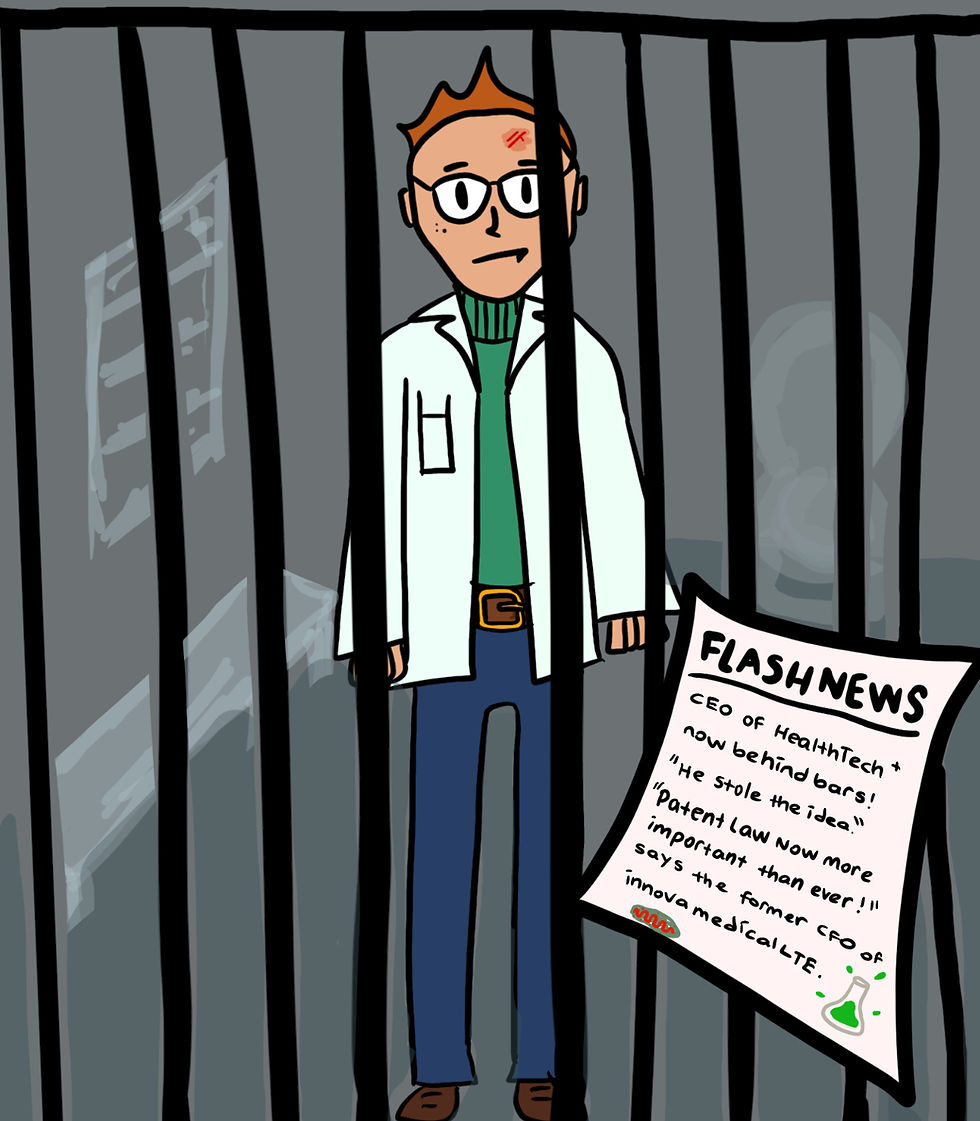The Impact of Mindset on Medical Care
- Isaac Gleiser
- Jan 14, 2025
- 6 min read
Written by: Isaac Gleiser
Edited by: Leila Torres Garcia, Kristine Chung, and Dylan Jackson
Illustrated by: Ariel Brown-Ogha

In the last few decades, new treatments to fight various illnesses have emerged, causing significant biomedical advances that have increased the effectiveness of therapies. Despite emerging treatments, some patients might underestimate how much their mindset can impact their treatment and healing process. It is vital to look into this topic since it can enhance the quality of healthcare systems if addressed appropriately. In fact, according to a study by Crum et al., patients who develop a mindset that they will heal can experience significant benefits in an estimated 60% to 90% of conditions, including pain, anxiety, depression, Parkinson’s, and immune deficiencies [1-2]. This article evaluates the extent to which clinicians should help patients develop a positive and resilient mindset to improve treatment and recovery outcomes, addressing the potential benefits and drawbacks.
To understand why mindset matters, examining how it influences patients' behavior and choices in the face of illness is essential. For example, Zion et al. found that cancer patients who do not approach treatments with a positive and resilient mindset may find themselves in a cycle of worry and anxiety because they feel hopeless. Burdened by adversity from negative thoughts, these patients often lack the motivation to take an active role in their medical care. This can lead patients to believe their bodies are working against them, causing them to seek unnecessary treatments that can affect their health [3]. According to Lyu et al., negative mindsets not only increase anxiety but also lead patients to request unnecessary treatments, such as antibiotics or surgeries, which carry risks like drug resistance or postoperative complications [4].
Continuing with how patients' mindsets can influence their choices, Zion et al. compared patients who regarded cancer as a "catastrophe" to those who viewed it as an opportunity to learn and grow. Although the former group of patients had good reason to believe that cancer is adverse, this mindset can affect their quality of life. This is because, as shown in the study, the latter group of patients who endorsed a positive attitude were open to appreciating life, inspiring personal growth, and motivating beneficial lifestyle changes like eating well and exercising [3].
Knowing that patients' mindsets can affect their attitudes and reactions, it is vital to evaluate how a mindset can also affect patients subconsciously. Crum and Zuckerman demonstrated that a mindset or expectation of healing can activate an anatomical response by triggering the immune, cardiovascular, and neuroendocrine systems through various mechanisms like reducing β-adrenergic activity, which moderates cardiovascular function [2]. Such physiological responses can directly affect the outcomes of patients with certain illnesses. Furthermore, Crum et al. found that physician empathy has been associated with better clinical outcomes for patients with diabetes, including better hemoglobin A and LDL cholesterol levels–both statistics linked to better overall health [1].
Anatomically, when patients react more adversely to trauma, they release more stress hormones, which may compromise health and resilience [5]. Furthermore, according to Lussier and Richard, "[a] physician's empathy helps a patient to manage what are sometimes intense emotions and makes it easier for the patient to begin the therapeutic process" [6].
With this in mind, it is crucial to mention the study by Howe et al. [7]. The study examined how mindset affects oral immunotherapy (OIT), a treatment where patients gradually build resistance to allergens through small, controlled exposures. For the research, families were randomly assigned to either the "symptoms as positive signals" (SAPS) or the "symptoms as side effects" (SASE) condition. Patients with the SAPS mindset improved their treatment experience—regarding anxiety and symptom rates—and outcomes. The patients' outcomes were measured with blood samples taken before and after the treatment was completed. The researchers found that SAPS patients experienced increased treatment efficacy, as measured by higher levels of IgG4, a specific antibody produced in response to allergens. Additionally, SAPS patients were less likely to experience symptoms at the end of treatment, suggesting that their changing mindsets encouraged OIT success. This study showcases the significant extent to which clinicians can alter their patients' outcomes and experiences in a given treatment by being mindful of fostering a positive and empowering mindset that enhances patient engagement and treatment efficacy [7].
Building on these findings, it becomes apparent that physicians must be better equipped to communicate with their patients to improve the healthcare system and make patients more optimistic about their condition and treatment. An average physician performs 160,000 to 300,000 interviews during their career [8]. Given the sheer number of interactions, physicians have countless opportunities to foster trust and positivity, which can directly enhance patients' mindsets and health outcomes.
Recognizing this gap, medical schools need to integrate communication skills classes into their curricula to improve the healthcare system by harnessing the power of patients' mindsets. For instance, according to Shashkevich, most healthcare professionals don’t consider the significant importance of individuals' mindsets in the context of treatment effectiveness and healing [9]. One of the leading causes of this oversight is that healthcare and education systems generally do not emphasize psychological training. Instead, in the United States, for example, communication skills are only reinforced during the early years of medical school; some studies suggest that communication skills decline during the four years of medical school due to a lack of reinforcement [10].
In fact, "the most common and effective ways to teach communication skills to medical students are simulated patients and volunteer outpatients" [11]. Accordingly, medical schools should implement more courses in communication skills, especially in the preclinical years.
This research indicates that, rather than following the current model of solely testing medical students in an early examination, it would likely be more effective for students to learn communication skills in a hands-on, clinical setting throughout their training.
People's mindsets can affect their physical healing during and after medical treatment. Therefore, medical schools must incorporate communication skills into their curriculum so physicians can learn valuable lessons on expressing themselves effectively to ensure their patients develop the best possible mindset. By equipping future physicians with these skills, medical education can reshape doctor-patient encounters into healing experiences where empathetic dialogue inspires patients to cultivate resilience, improve their habits, and achieve enduring improvements in their health.
References
[1] Crum, A. J., Leibowitz, K. A., & Verghese, A. (2017). Making mindset matter. BMJ: British Medical Journal, 356. https://www.jstor.org/stable/26943967
[2] Crum, A., & Zuckerman, B. (2017). Changing Mindsets to Enhance Treatment Effectiveness. JAMA, 317(20), 2063–2064. https://doi.org/10.1001/jama.2017.4545
[3] Zion, S. R., Schapira, L., & Crum, A. J. (2019). Targeting Mindsets, Not Just Tumors. Trends in cancer, 5(10), 573–576. https://doi.org/10.1016/j.trecan.2019.08.001
[4] Lyu, H., Xu, T., Brotman, D., Mayer-Blackwell, B., Cooper, M., Daniel, M., Wick, E. C., Saini, V., Brownlee, S., & Makary, M. A. (2017). Overtreatment in the United States. PloS one, 12(9), e0181970. https://doi.org/10.1371/journal.pone.0181970
[5] Rahill, G. J., Ganapati, N. E., Joshi, M., Bristol, B., Molé, A., Jean-Pierre, A., Dionne, A., & Benavides, M. (2016). In their Own Words: Resilience among Haitian Survivors of the 2010 Earthquake. Journal of health care for the poor and underserved, 27(2), 580–603. https://doi.org/10.1353/hpu.2016.0100
[6] Lussier, M. T., & Richard, C. (2010). Should family physicians be empathetic? Canadian Family Physician, 56(8), 740-742. https://www.cfp.ca/content/cfp/56/8/740.full.pdf
[7] Howe, L. C., Leibowitz, K. A., Perry, M. A., Bitler, J. M., Block, W., Kaptchuk, T. J., Nadeau, K. C., & Crum, A. J. (2019). Changing Patient Mindsets about Non-Life-Threatening Symptoms During Oral Immunotherapy: A Randomized Clinical Trial. The journal of allergy and clinical immunology, 7(5), 1550–1559. https://doi.org/10.1016/j.jaip.2019.01.022
[8] McKinlay, J., & Marceau, L. (2008). When there is no doctor: reasons for the disappearance of primary care physicians in the US during the early 21st century. Social science & medicine (1982), 67(10), 1481–1491. https://doi.org/10.1016/j.socscimed.2008.06.034
[9] Shashkevich, A. (2017, March 8). Patient mindset matters in healing and deserves more study, experts say. Stanford Medicine. https://med.stanford.edu/news/all-news/2017/03/health-care-providers-should-harness-power-of-mindsets.html
[10] Rider, E. A., Hinrichs, M. M., & Lown, B. A. (2006). A model for communication skills assessment across the undergraduate curriculum. Medical teacher, 28(5), e127–e134. https://doi.org/10.1080/01421590600726540
[11] Adnan A. I. (2022). Effectiveness of Communication Skills Training in Medical Students Using Simulated Patients or Volunteer Outpatients. Cureus, 14(7), e26717. https://doi.org/10.7759/cureus.26717
[12] Andrade G. (2019). The ethics of positive thinking in healthcare. Journal of medical ethics and history of medicine, 12, 18. https://doi.org/10.18502/jmehm.v12i18.2148
[13] Chamorro-Premuzic, T., & Lusk, D. (2017, August 16). The Dark Side of Resilience. Harvard Business Review. https://hbr.org/2017/08/the-dark-side-of-resilience
[14] Choudhary, A., & Gupta, V. (2015). Teaching communications skills to medical students: Introducing the fine art of medical practice. International journal of applied & basic medical research, 5(Suppl 1), S41–S44. https://doi.org/10.4103/2229-516X.162273
[15] Mustian, K. M., Sprod, L. K., Palesh, O. G., Peppone, L. J., Janelsins, M. C., Mohile, S. G., & Carroll, J. (2009). Exercise for the management of side effects and quality of life among cancer survivors. Current sports medicine reports, 8(6), 325–330. https://doi.org/10.1249/JSR.0b013e3181c22324
[16] Prentice, R. (2022, January 24). Optimism Bias: The Dark Side of Looking at the Bright Side. Ethics Unwrapped. https://ethicsunwrapped.utexas.edu/optimism-bias-the-dark-side-of-looking-at-the-bright-side




Comments